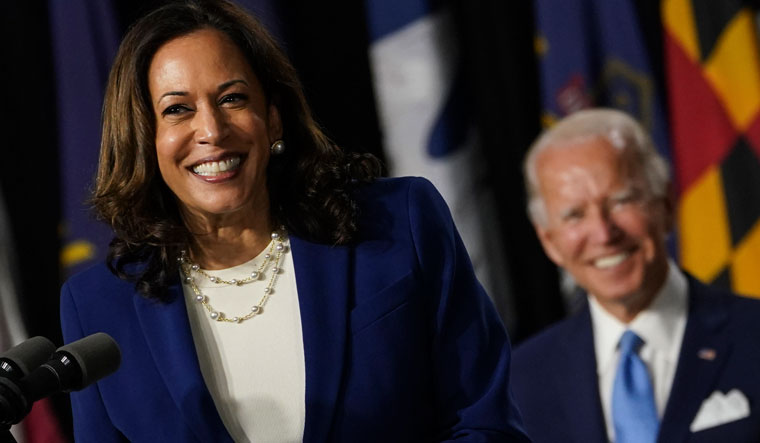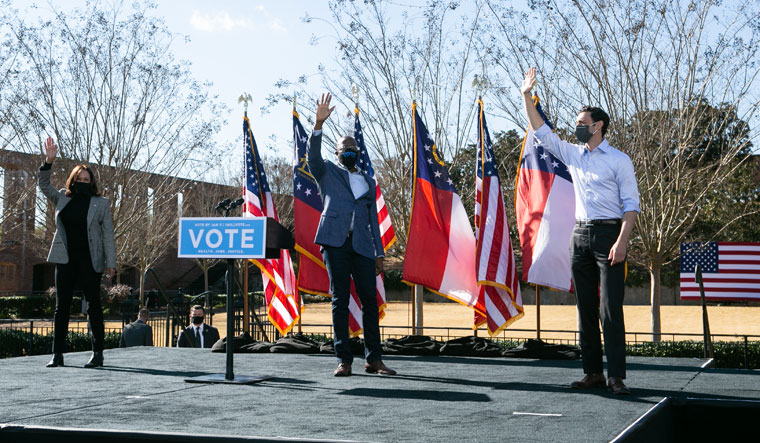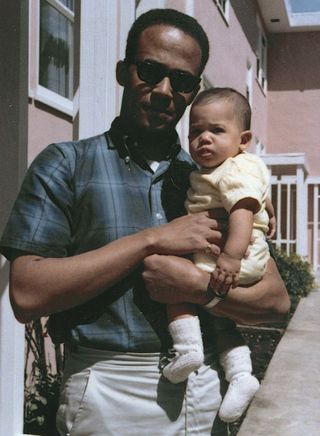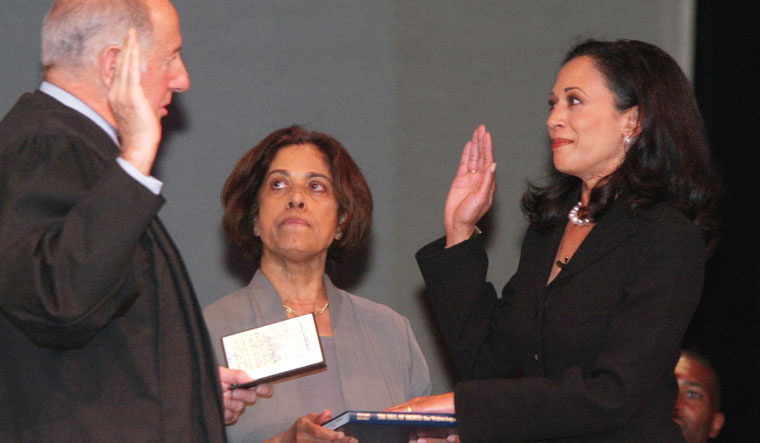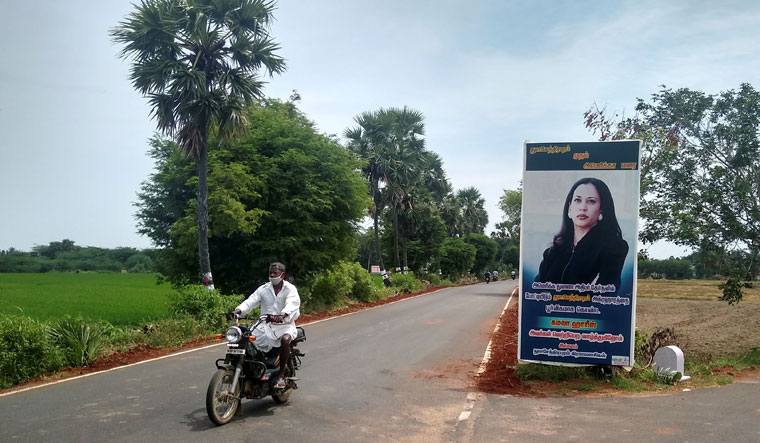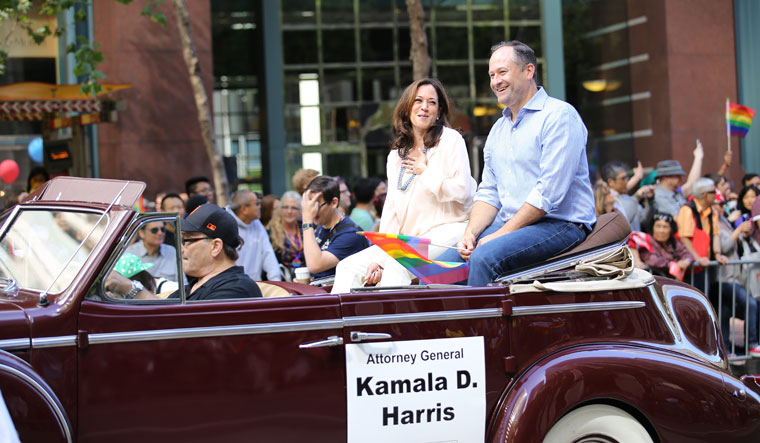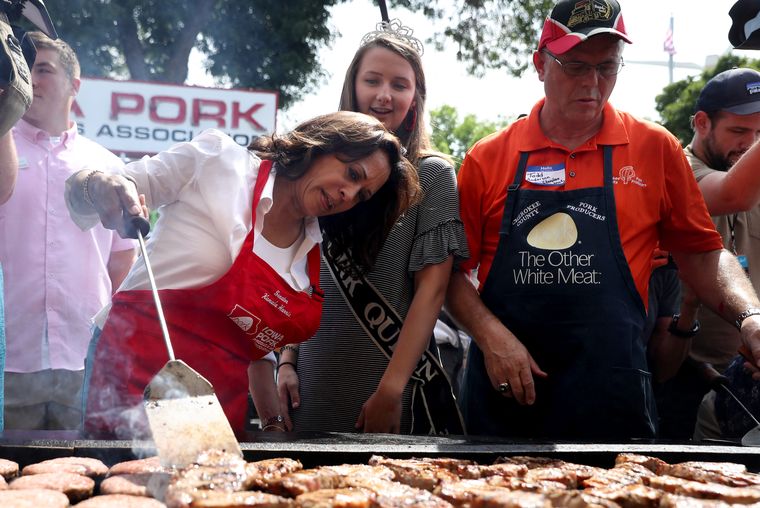When Kamala Harris arrived in Washington, DC four years ago as a new senator from California, she was offered a place on the senate intelligence committee, one of the most powerful and secretive bodies of the Congress. As the junior-most member of the committee, she sat at the far end of the row of senators during its meetings. But once the committee started investigating Russian involvement in the 2016 presidential elections, Kamala’s experience as a prosecutor brought her to the centre of the committee’s proceedings. Her incisive interrogation made Trump officials jittery. Attorney general Jeff Sessions, who had served in the senate for two decades, was so shaken after a round of questioning that he pleaded for mercy. “I'm not able to be rushed this fast,” he told Kamala during one of the hearings. “It makes me nervous.” She smiled warmly in response. But there was no respite for Sessions.
Kamala, who takes over as the 49th vice president of the United States on January 20, will be one of the most powerful occupants of that office. With Georgia, once the bastion of the southern confederates, electing two Democrats—a black preacher and a young Jew—on January 5, the senate is now split evenly between Democrats and Republicans. As the ex officio head of the senate, Kamala can break the tie on crucial votes, giving her a major say in critical appointments and an outsized influence on the senate’s legislative agenda. President Joe Biden will have to work more closely with her and be more accommodative to her priorities. She will not be the president's rubber stamp.
The audacious fighter
When Biden named Kamala as his running mate, he singled out her fighting spirit as a key factor behind his choice. “A fearless fighter for the little guy” was how he introduced her. Former national security adviser Susan Rice and California Congresswoman Karen Bass who were on Biden’s shortlist, too, called her “a tenacious fighter”.
In 1989, Kamala was hired as a deputy district attorney in Alameda county, California, even before she finished law school. The DA was impressed by her brilliant academic record and her performance as an intern. Unfortunately for Kamala, she failed to clear the bar exam. “My mother had always told me, ‘Don’t do anything half-assed…. But there I was… in studying for the bar, I had put forward the most half-assed performance of my life,” wrote Kamala in her memoir The Truths We Hold. She was devastated, but did not give up. Fortunately for her, the DA’s office let her keep the job and retake the exam, which she cleared in the second attempt.
Kamala became a nationally recognised name after her fearless campaign on behalf of the Californians who lost their homes in the 2008 subprime mortgage crisis. In January 2011, soon after she assumed office as the 32nd attorney general of California, Kamala took on the Obama administration and the nation’s leading banks as she was convinced that homeowners were getting a raw deal. She felt the settlement offered by the banks was inadequate and walked out of the negotiations. The Obama White House, which realised that California’s withdrawal will scuttle the whole process, tried its best to woo Kamala. She even received a much sought-after invitation to sit in the first lady’s box for the 2012 state of the union address. Kamala politely declined, took the banks head on, and ultimately won a $20 billion settlement for her state’s beleaguered homeowners. Obama himself praised her afterwards. “She is tough, and she is exactly what you'd want in anybody who is administering the law," he said. He added that Kamala was by far the best-looking attorney general in the country, and had to apologise for the remark.
Kamala learned the basic lessons of freedom and justice from her parents, Shyamala Gopalan and Donald Harris, immigrant academics who loved a good fight for a just cause. When Shyamala came to the United States in the late 1950s, she was only 19. She had to fly halfway across the world because as a woman, she could not find a place in a graduate programme of her choice in India or even in the UK. She wanted to study biochemistry. But at Lady Irwin College in Delhi from where she completed her undergraduate studies, her only option was home science.
The heritage of her father, who belongs to a landowning family in Jamaica, too, has influenced Kamala’s character. Although her worldview and political philosophy are markedly different from Donald's radical leftist ideology, she has inherited his conviction to defend the truth, even the uncomfortable ones. Donald, for instance, never tried to hide the fact that one of his ancestors was Hamilton Brown, an Irish sugar planter and slave owner. When Kamala announced her decision to run for president, her detractors said she did not represent black Americans as she came from a family of slave owners. It is, however, quite possible that Kamala descended from both slaves and slave owners. According to a study published last July in the American Journal of Human Genetics, although women comprised only about one-third of the black slaves brought to the Americas, they passed along nearly twice as much DNA to today’s black population because they were often raped by their white owners.
Donald was raised by his paternal grandmother Christina Brown, whom everybody called “Miss Chrishy”. Kamala still remembers her visits to Jamaica as a young girl and sitting long hours on her great-grandmother's porch, listening to lengthy political discussions while chomping on an unlimited supply of sugarcane.
Miss Chrishy was a diehard supporter of Sir Alexander Bustamante, the anti-colonial activist and Labour Party stalwart who became the first prime minister of Jamaica. Miss Chrishy believed that labour was at the heart of everything in life. During Easter and Christmas, she sent Donald with packets of bun and cheese—a Jamaican delicacy—and other little gifts to needy families. Growing up in such a household, Donald was disillusioned by Britain’s “static rigidity of pomp, ceremony and class” and the manner in which it was replicated in Jamaica by the island's native elites. When he won a prestigious scholarship offered by the colonial government in 1961, a year before Jamaica became independent, everyone expected him to go to Britain. But Donald flew to the US and joined the University of California, Berkeley, for a PhD in economics.
Shyamala met Donald at a talk he delivered on civil rights in 1962. Impressed, she walked up to him and introduced herself. Donald, too, had noticed her as she was in a sari. The two immigrants, who shared the bitter hangover of a common colonial past, fell in love quickly. Kamala’s niece Meena Harris said the civil rights movement gave them a shared context. “They both identified as people of colour and people who were oppressed by a white-male-dominated world.”
The couple drifted apart despite the shared ideals and the birth of Kamala in 1964 and of Maya three years later. Shyamala filed for divorce in 1972. “Had they been a little older, a little more emotionally mature, maybe the marriage could have survived. But they were so young. My father was my mother’s first boyfriend," wrote Kamala. The divorce was finalised after a custody battle which Donald lost.
Although the custody battle was bitter, Kamala said her parents divided their material belongings quite amicably. Shyamala took the slide projector, the movie screen and the 20 record albums the family owned. Donald got three metal bookshelves and a filing cabinet. Only division of the books caused some argument.
Kamala seems to have a complicated relationship with her father and does not speak much about him. But she identifies herself as a black Baptist, in the tradition of her dad’s family, although her mother used to take her to a church and to a temple. But culturally, her mother raised her as a black kid.
In February 2019, a month after formally announcing her candidacy for president, she admitted to smoking a joint in college. When asked whether she supported legalising marijuana, she said, “Half my family’s from Jamaica—are you kidding me?” The comment elicited a harsh rebuke from Donald. "My dear departed grandmothers as well as my deceased parents must be turning in their graves right now to see their family’s name, reputation and proud Jamaican identity being connected, in any way, jokingly or not, with the fraudulent stereotype of a pot-smoking joy seeker and in the pursuit of identity politics," he wrote in a letter to a Jamaican website.
Her mother's daughter
In her memoir, Kamala describes her mother as a hard taskmaster, who had no patience for self-indulgence. Good behaviour and achievements never received much praise from Shyamala. “Why would I applaud you for something you were supposed to do,” she would ask.
Shyamala often served her children what she called a smorgasbord. “She'd use a cookie cutter to make shapes in pieces of bread, then lay them out on a tray with mustard, mayonnaise, pickles and fancy toothpicks. In between the bread slices, we'd put whatever was left in the refrigerator from the previous nights of cooking.” It took Kamala years to figure out that the smorgasbord was nothing more than leftovers.
Kamala’s grandmother, Rajam Gopalan, too, was a formidable woman. Back in the 1940s, she drove through villages in her Volkswagen Beetle, educating women about birth control. She would chastise men who ill-treated their wives. “She was the purest form of the Harris women,” said Kamala. “We’re all diluted versions of my grandmother.” When Kamala was elected district attorney of San Francisco, Rajam organised a party in her honour. Kamala flew down to India for the celebrations. “One by one, people came to pay homage,” said Kamala. “It was like a scene out of The Godfather.”
Her grandfather P.V. Gopalan started out as a stenographer, but rose to be a senior civil servant. His last assignment was in Zambia, where he handled an influx of refugees from Rhodesia. Kamala, who has never worked in the private sector, said it was her grandfather who kindled her interest in public service.
Ambition is not a vice
Ambitious is an adjective that has stuck to Kamala, like burrs to a sari. Less charitable critics even call her opportunistic. They cite her brief, torrid affair with Willie Brown, who was one of California’s most colourful and powerful politicians. Kamala was a 29-year-old up-and-coming prosecutor when she first met Brown, who was then the speaker of the state assembly. “Kamala Harris... is something new in Willie’s love life,” wrote legendary columnist Herb Caen in the San Francisco Chronicle. Brown, 60, had been separated from his wife for a long time. In December 1995, when he was elected mayor, Caen called Kamala San Francisco’s “first-lady-in-waiting”.
Brown gave Kamala's career a push while they were dating. He nominated her to the California Unemployment Insurance Appeals Board and to the Medical Assistance Commission, which together paid her around $80,000 a year on top of her prosecutor’s salary. He also gifted her a BMW. More importantly, he introduced Kamala to the high and mighty in San Francisco.
The connections came handy when Kamala ran for San Francisco district attorney in 2002. She got Mark Buell, a Democratic mega-donor and real estate developer, to be her campaign finance chair; she was friends with his stepdaughter Summer Tompkins Walker. Buell assembled a group of wealthy San Franciscans who helped her outspend all her rivals and win the election. That circle of Pacific Heights socialites and mega-donors continues to be a major source of support for Kamala.
When Biden put Kamala in his VP shortlist, many of his team members pointed out that she was “way too ambitious” to be a loyal vice president. Some comments she made during the heat of the primaries still rankled. In May 2019, when asked about the possibility of a Biden-Kamala ticket, she said Biden would make a great VP candidate. Two months later, during the first Democratic debate in Miami, Florida, she accused Biden of working with segregationists in the senate and said he had opposed busing as a tool of desegregation. Kamala's popularity surged after the attack, but it faded in no time, forcing her to drop out of the presidential race.
Biden's wife, Jill, and his sister, Valerie, were annoyed with Kamala's line and style of attack. There were also concerns about a potential conflict with her staff from California.
In her defence, Kamala has never denied that she is ambitious. There is no doubt that she will be serving as the 77-year-old Biden's vice president with an eye on the Oval Office. But Biden seems to be fine with it. He has said many times that he wanted a vice president who is prepared to be president on day one.
The art of compromise
“I’m not trying to restructure society,” Kamala explained her political philosophy in an interview with The New York Times. “I’m just trying to take care of the issues that wake people up in the middle of the night.” She does not favour grand proposals, like the radical economic blueprints offered by Senators Bernie Sanders and Elizabeth Warren. In her view, policy has to be relevant. “That’s my guiding principle: Is it relevant? Not, ‘Is it a beautiful sonnet?”
Although Kamala hates being called the female Obama, she seems to be heavily influenced by his political philosophy and is nothing like her father who believes in an explicitly egalitarian agenda. Biden was impressed by her middle-of-the-road policy prescriptions. He also liked the fact that she is a law-and-order Democrat, well connected to wealthy donors, even as the pro-Sanders faction of the party says she is a shallow pragmatist without any ideological commitment.
As a politician and as a prosecutor, Kamala has never been a prisoner of ideology. In 2004, barely three months after taking over as San Francisco DA, Kamala had to prosecute a gangster for shooting and killing a 29-year-old police officer, Isaac Espinoza. During her election campaign, she had said that she was against death penalty. And, she announced that she would not seek capital punishment for Espinoza’s killer even before the officer's funeral. It infuriated police officers across California. A former police officers' union president said “having a press conference before the kid was even in the ground was such a cold political move”. Even the two Democratic senators from California, Barbara Boxer and Dianne Feinstein, criticised Kamala and asked federal officials to seek death penalty if she failed to do so. But Kamala refused to budge. She knew that her constituency was the ultra liberal San Francisco, which was opposed to capital punishment.
But Kamala knew the perils of her position. In 2010, when she ran for attorney general, she scraped through by less than a single point, while every other Democratic candidate in statewide races won by double digits. And she realised that a blanket opposition to death penalty will hurt her future prospects. In 2014, as attorney general, she vigorously defended the constitutionality of death penalty at a federal court.
Kamala faced much opprobrium for the anti-truancy initiative she implemented as San Francisco DA, which threatened parents with prosecution if their kids missed school. Cheree Peoples, 33, was one such victim of Kamala’s misplaced overzealousness. Peoples, a single black mother, was living with her 11-year-old daughter Shayla in the Los Angeles suburb of Buena Park. On the morning of April 18, 2013, a police team was at her doorstep with an arrest warrant. She barely got time to put on a jacket over her pajamas before she was handcuffed and taken into custody. Her crime? Shayla had missed 20 days that school year.
Under Kamala’s law, it was a criminal misdemeanour for parents to allow kids to miss more than 10 per cent of school days without a valid excuse. It imposed a fine of $2,500 or more or one year in jail as punishment for truancy. But Shayla missed school because she was suffering from sickle cell anaemia. Her school had her hospital documents. Yet the mother had to fight a prolonged legal battle to clear her name.
After Kamala announced her decision to run for president, an old video resurfaced. In it she was seen happily narrating how she had sent one of her lawyers to intimidate a homeless single mother whose children were missing school. She instructed him to “look really mean” while threatening the woman. She also criticised those who wanted to put more money into education instead of building new prisons, calling them “naive sloganeers who do not understand crime prevention”.
Over the past few years, Kamala’s views on the issue have changed and she now agrees that parents of truant children need help, not punishment.
It was during the anti-truancy campaign that she met Douglas Emhoff, a high-profile entertainment lawyer from Los Angeles, on a date arranged by her best friend Chrisette Hudlin, a public relations executive. Kamala wrote in her memoir that as a public figure and a woman in her late 40s (she was then attorney general of California) it was virtually impossible for her to have a normal dating life. “Single women in politics are viewed differently than single men. We don’t get the same latitude when it comes to our social lives.”
But Kamala and Doug hit it off. To impress Kamala, he even enrolled in a cooking class and trained as a sous-chef. Kamala quickly developed a rapport with his two children from his first marriage with Kerstin Emhoff, a film producer. Kerstin, in fact, volunteered to help Kamala’s presidential campaign with her creative expertise and connections. For the kids, Cole and Ella, Kamala is momala. “I’ve had a lot of titles over my career. But momala will always be the one that means the most,” said Kamala.
After a quick courtship, Doug proposed to Kamala at her San Francisco apartment on March 26, 2014. She had just returned from an official trip to Mexico and was preparing to leave for a romantic getaway to Italy with Doug the next morning. When he walked in, she was slightly flustered as she had not packed for the Italian trip and she could not find her favourite black pants. Doug, too, looked distracted. So they decided to stay in and order food from their favourite Thai place.
As Kamala rifled through the menu, Doug told her that he wanted to spend the rest of his life with her. For a moment, she did not realise what he was saying. “That's nice honey, should we have chicken or shrimp on the pad thai?” she replied. It was only then that she noticed he was down on one knee and was holding up an engagement ring, a round diamond set on a platinum band.
“I looked at him there, on one knee, and burst into tears. Mind you, these were not graceful Hollywood tears streaming down a glistening cheek. No, I’m talking about snorting and grunting, with mascara smudging my face,” Kamala wrote in her memoir.
The couple were married on August 22 in an intimate ceremony at a Santa Barbara courthouse, officiated by Maya. Doug wore a flower garland to honour Kamala's Indian background, and the service ended with the couple breaking a glass to mark the bridegroom’s Jewish heritage.
Doug has announced that he would leave his law practice to focus on his new role as the first second gentleman of the United States. He will also teach a two-credit course on entertainment law disputes at the Georgetown University Law Center in Washington, DC.
The human touch
A year into her senate term, Kamala was meeting a group of young Latino congressional staffers at the senate office building. According to a report in Vogue, as soon as she entered the conference room, the staffers got up from their chairs. But one of the young guys continued to be seated. Kamala was visibly irritated. She walked up to him and asked him to stand up. The startled young staffer sprang to his feet, extended his hand and introduced himself. “Kevin,” he said. Unimpressed, Kamala asked for his last name, before moving on.
She then told the group about her experience of working as an intern for senator Alan Cranston during her sophomore year in college. “He (Cranston) was succeeded by Barbara Boxer, and I succeeded Barbara Boxer. So you never know!” She could have ignored the whole thing as a minor transgression by a young staffer. It seemed like a harsh tutorial for the young staffers in etiquette and decorum, but it was also a warm personal lesson about the endless opportunities before them.
When Kamala was serving as district attorney of San Francisco, she had a young woman called Lateefa Simon working for her. Simon was once caught shoplifting, but she turned her life around. By the time she was 19, she was serving as executive director of the Lawyers’ Committee for Civil Rights. Kamala recruited her to run her ‘Back on Track’ initiative, an alternative to incarceration for first-time nonviolent offenders.
Simon once showed up for work in San Francisco’s predominantly black Bayview neighbourhood in jeans and a hoodie. Kamala felt that was inappropriate. “Would you go to Pacific Heights (one of the city’s whitest and wealthiest neighbourhoods) wearing that?” she asked Simon, and then gave a quick lesson in dressing for work. She also bought her a brand new suit. It was Simon’s first suit and she still keeps it.
As a prosecutor and as a lawmaker, Kamala is known for her tough demeanour and no-nonsense attitude. But she is no stuck-up snob. Although she loves her Manolo Blahnik heels and Chanel handbags, she has also made news with her casual style. Her penchant for Converse Chuck Taylor sneakers is well known, although some footwear critics say “it is part of a larger challenge to outmoded concepts of femininity”. She was once stopped from entering the senate chamber because she was wearing sneakers.
Kamala loves her wine, a refreshing change in Washington, DC, dominated by teetotallers like Donald Trump and Mike Pence. Even Biden does not drink. Kamala has an account at the Rock Wall Wine Company in Alameda and she loves to pick up her wine by herself whenever she has time.
Kamala is an excellent cook. Her first speciality was scrambled eggs, which she mastered when she was in the third grade. She loved to shape it like a smiling face and top it liberally with cheese. Even as a busy politician, on most Sundays Kamala would cook the family dinner, a tradition which she says she is planning to stick to as much as possible.
Kamala’s inherent capability to build and nurture personal relations was one of the reasons Biden picked her as his vice president. He was swayed by her close friendship with his son, Beau, who is no more. While Kamala was serving as California's attorney general, Beau held the office in Delaware. As she faced intense pressure during the housing foreclosure crisis, Beau was one of her closest allies. He launched his own investigation into the scam and shared details with Kamala.
“He had every reason to keep his head down and toe the line," wrote Kamala. "But that wasn’t who Beau was. Beau was a man of principle and courage…. There were periods when I was taking heat, when Beau and I talked every day, sometimes multiple times a day. We had each other’s backs.” They worked together on many other important law enforcement issues such as sex trafficking and gun violence. After Beau’s untimely death from brain tumour, his personal staff prepared a list of about 60 people who should be the first to be informed. Kamala was on that list.
Biden, who values personal relationships, referred to Kamala’s friendship with Beau while naming her as his running mate. “I first met Kamala through my son Beau,” said Biden. “He had enormous respect for her and her work. I thought a lot about that as I made this decision. There is no one’s opinion I valued more than Beau’s and I’m proud to have Kamala standing with me on this campaign.”
As Kamala is on the cusp of making history, her unique life story and heritage are certain to shape her vice presidency. Her father remembers a visit she made to his hometown 50 years ago. “We trudged through the cow dung and rusted iron gates, up-hill and down-hill, along narrow unkempt paths, to the very end of the family property, all in my eagerness to show to the girls the terrain over which I had wandered daily for hours as a boy,” wrote Donald. “Upon reaching the top of a little hill that opened much of that terrain to our full view, Kamala, ever the adventurous and assertive one, suddenly broke from the pack... and took off like a gazelle in Serengeti, leaping over rocks and shrubs and fallen branches, in utter joy and unleashed curiosity, to explore that same enticing terrain.”
As one of the most powerful vice presidents ever, Kamala will be facing even more enticing terrains and exacting challenges in the days to come. If she succeeds, it will redefine American politics.


